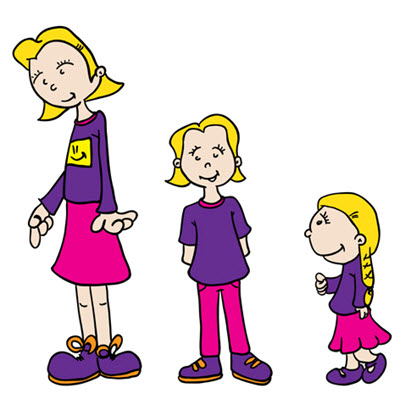The Big Mistake doesn’t cause a lot of anguish…until it snaps and falls.
Many people spend more time caring for their vehicles or their yards than they do their relationships. Others spend much more time cultivating and developing their professional relationships than they do their closest, most prized relationships. I call this The Big Mistake. It simply doesn’t make sense.
And yet…
…this is what we do. We give our best attention to things or to our least important relationships. It’s such a bad mistake because we humans are wired to function best inside life-giving relationships. Most often, these life-giving relationships are family or friends.
The Big Mistake is rarely corrected without a crisis.
Relationship crises and family crises can sneak up on us.

A mother and daughter have a blow-out argument. Or, a secret is discovered that throws the whole family into turmoil. A teenager turns to addiction for comfort. Or, Mom and Dad have a fight that seems to top all the other fights, complete with threats of divorce and “I’ll take the kids away from you!”
Or, it can be the son that suddenly refuses to speak to a step-parent for days because of the rage that he carries. Or, it can be a young adult with anxiety and depression that leaves college to move back in with parents. These are just a few of the family crises that present an opportunity for change…if you are ready enter therapy.
A relationship crisis can stop you in your tracks.

Sometimes people can see it coming and sometimes it’s a total shock. Often a crisis is the only thing that gets the attention of family members. They are suddenly willing to do something about it because ignoring the problem finally seems, well, out of the question.
So there is this crucial moment of opportunity to change because everyone recognizes that there is a problem…finally! Now, at last, they are willing to give each other time and attention. But the opportunity to reverse the Big Mistake is often lost, because people don’t know how to repair relationships at the deeper level where the crisis started.
My method of addressing family therapy and relationship therapy seizes this moment when people are ripe for change.
Many families minimize the magnitude of a crisis and the lasting effects. They don’t know what to do, so they just wait and hope the damage won’t be too great. It becomes an unspoken agreement to pretend.

The Big Mistake can lead to the big turnaround with greater satisfaction.
I find that family members of all ages will often participate whole-heartedly in family therapy, despite some initial reluctance. For family members to get on board with attending family therapy sessions, three things need to happen:
- Each person needs to know that they will have a voice. I make sure that this happens.
- All the stakeholders in the solution must be on the same page as to what the crisis means. I facilitate the discussion to get there.
- Each person needs to see some relief from their own frustration as the family discusses changes.
Gradually, a family begins to see that the recent crisis can lead to more closeness, more respect, and communication that is a lot less stressful for everyone.
Ahh… that feels SO good!
Also, the family therapy experience helps people know how to reverse the Big Mistake: They learn how to give regular attention to cultivating a healthy family life together and upgrading their communication skills. I meet with families online and it is surprising how well this works to give each person their own space to be heard.
Much of the family therapy that I have done over the years deals with parenting issues.

Being a parent myself, I know how confusing it can be. I have found that I am usually able to connect well to people of all different ages in a family because of my own experience as well the dual emphasis of my training on teens/children and adults. If you and a family member decide to meet with me, you will find that I am intensely interested in unpacking the inner dynamics of your family so that practical changes can happen as fast as possible.
Family therapy focuses our attention together on patterns of relationship interactions.
Families and relationships can often make a big turnaround by understanding these patterns:
- Anger and conflict patterns of anger and frustration—e.g., one family member expresses anger by punishing everyone with silence while another family member makes everyone walk on eggshells fearing the next outburst
- Needs and how they typically get met
- Power and boundaries—Such as parental authority or decision-making
- Expectations, especially regarding independence, responsibility, and closeness
- Unwritten family rules, especially for what can and cannot be talked about, or who gets blamed
- Polarities and vicious cycles—e.g., Dad is too lenient because he thinks Mom is too strict while Mom is strict because she sees Dad as too lenient
- Coalitions where one parent builds alliances with one or more of the kids against the other parent
There are three ways that family therapy can turn things around.

First, the parenting styles, particularly discipline and communication, must be adapted to the unique needs of the family members. Anyone who has spent much time being a Mom or a Dad knows that a one-size-fits-all approach to parenting doesn’t work very well. This is because your children have different personalities and needs. Just as important is the fact that kids are in different developmental stages, and so their needs, hurts, and frustrations fit with the stage they are in.
Second, family therapy brings out the creative energy of the family to be much more intentional about how to be a family as well as how to be an individual inside the family. This involves creating or strengthening family rituals of connection. This can be something as simple as mother and daughter having an advice-free lunch together. Or, it can involve rethinking the family vacation
Third, family therapy can reset the emotional thermostat. This has to do with how it feels to be in your family. Changing the emotional atmosphere from tension, anger, and stress to an atmosphere of joy and peace is not as easy as adjusting the temperature of the room. But it can be done! And when it changes, everyone knows it and everyone feels it.
Can you figure all this out on your own? Perhaps. But will it happen soon enough?
Why don’t you contact me and let’s talk about it?
